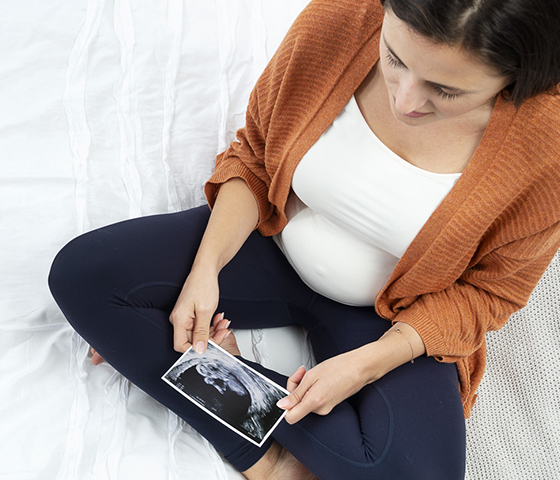Info for Health Care Providers
It's time for NIPT for all
Noninvasive prenatal testing (NIPT), also known as cell-free DNA (cfDNA) screening, is a type of prenatal aneuploidy screening test. With a simple maternal blood draw, NIPT can noninvasively screen for the presence of fetal chromosomal aneuploidies as early as week 10. ACOG and SMFM recognize NIPT as a screening option for all pregnant women, regardless of age or risk.2
Noninvasive
NIPT is as safe and simple as a blood draw.2

Accurate
Greater than or equal to 99.9% sensitivity and specificity for trisomies 21, 18, and 13 as early as week 10.1
Early
NIPT can be performed as early as week 10 of gestation until term.2

Get the facts about NIPT
Download this Fast Facts Sheet to get a quick overview of NIPT, and see how early prenatal genetic insights can help your patients and inform your decision-making process.
DownloadExpanded screening. Expanded insights.
With expanded NIPT, obtain a comprehensive view of all 23 chromosome pairs while limiting risk to your patient. Download this brochure to learn about expanded test options beyond chromosomes 21, 18, and 13.2,3
Download
Fewer invasive tests mean less maternal and fetal risk
Adopting and implementing NIPT brings several advantages over conventional prenatal serum screening to inform your pregnancy management.4-8
Number of unnecessary invasive procedures for Trisomies 21, 18, AND 13 out of 1000 pregnancies
NIPT
False-positive rate: 0.13%7
~1
unnecessary invasive procedure
vs
Conventional screening
False-positive rate: 4%9
40
unnecessary invasive procedures
Figures shown derived for a hypothetical population of 1000 pregnant women who would receive a false-positive result with each respective test, necessitating confirmatory diagnostic testing.
Hear how peers have incorporated NIPT into their practice
Intended Use
The VeriSeq NIPT Solution v2 is an in vitro diagnostic test intended for use as a screening test for the detection of genome-wide fetal genetic anomalies from maternal peripheral whole blood specimens in pregnant women of at least 10 weeks gestation. VeriSeq NIPT Solution v2 uses whole-genome sequencing to detect partial duplications and deletions for all autosomes and aneuploidy status for all chromosomes. The test offers an option to request the reporting of sex chromosome aneuploidy (SCA). This product must not be used as the sole basis for diagnosis or other pregnancy management decisions. Noninvasive prenatal testing (NIPT) based on cell-free DNA analysis from maternal blood is a screening test; it is not diagnostic. Test results must not be used as the sole basis for diagnosis. Further confirmatory testing is necessary prior to making any irreversible pregnancy decision.
Accuracy claims are specifically for VeriSeq NIPT Solution v2.
References
- Data on file, Illumina, Inc. 2019.
- Rose NC, Kaimal AJ, Dugoff, L, et al. ACOG Practice Bulletin 226: Screening for fetal chromosomal abnormalities. Obstet Gynecol. 2020;136(4):e48-e69.
- Pertile MD, Halks-Miller M, Flowers N, et al. Rare autosomal trisomies, revealed by maternal plasma DNA sequencing, suggest increased risk of feto-placental disease. Sci Transl Med. 2017;9(405):1-11.
- Platt LD, Janicki MB, Prosen T, et al. Impact of noninvasive prenatal testing in regionally dispersed medical centers in the United States. Am J Obstet Gynecol. 2014;211(4):368.e1-368.e7.
- Larion S, Warsof SL, Romary L, Mlynarczyk M, Peleg D, Abuhamad AZ. Association of combined first-trimester screen and noninvasive prenatal testing on diagnostic procedures. Obstet Gynecol. 2014;123(6):1303-1310.
- Bianchi DW, Parker RL, Wentworth J, et al; for CARE Study Group. DNA sequencing versus standard prenatal aneuploidy screening. N Engl J Med. 2014;370(9):799-808.
- Gil MM, Accurti V, Santacruz B, Plana MN, Nicolaides KH. Analysis of cell-free DNA in maternal blood in screening for aneuploidies: updated meta-analysis. Ultrasound Obstet Gynecol. 2017;50:302-314.
- Chudova DI, Sehnert AJ, Bianchi DW. Copy-number variation and false positive prenatal screening results. N Engl J Med. 2016;375(1):97-98.
- Santorum M, Wright D, Syngelaki A, Karagioti N, Nicolaides KH. Accuracy of first-trimester combined test in screening for trisomies 21, 18 and 13. Ultrasound Obstet Gynecol. 2017;49(6):714-720.